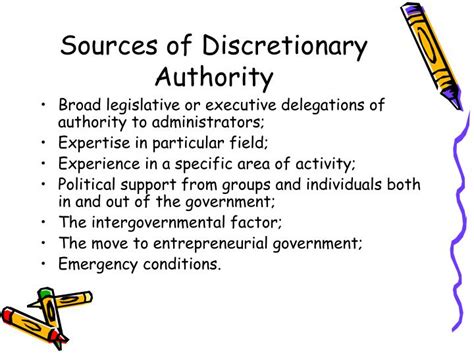In the complex and ever-changing landscape of public administration, the role of administrative discretionary authority has been a subject of ongoing debate. While some argue that it is a necessary tool for effective governance, others raise concerns about its potential for abuse and inaccuracy. This article delves into the multifaceted nature of administrative discretionary authority, exploring its potential benefits and risks.

Understanding Administrative Discretionary Authority
Administrative discretionary authority refers to the power granted to administrative agencies to make decisions and take actions within a defined scope, without being bound by specific rules or precedents. This authority is typically conferred by statutes or regulations that establish broad goals and objectives, but leave it to the agencies to determine the best course of action in specific situations.
Benefits of Administrative Discretionary Authority
- Flexibility and responsiveness: Administrative agencies can adapt their decisions to the unique circumstances of each case, allowing for more tailored and effective outcomes.
- Expertise and specialized knowledge: Agencies often possess specialized knowledge and expertise in their respective fields, enabling them to make informed decisions based on technical assessments and research.
- Innovation and problem-solving: Discretionary authority provides agencies with the ability to experiment with new approaches and find creative solutions to complex problems.
Risks of Administrative Discretionary Authority
- Potential for bias and abuse: Discretionary authority can provide opportunities for agencies to make decisions based on personal bias or political influence, leading to inaccurate or unfair outcomes.
- Lack of accountability: Agencies with discretionary authority may face less oversight and accountability for their decisions, potentially creating a risk of arbitrary or erroneous actions.
- Complexity and uncertainty: The absence of specific rules can make it difficult for agencies to provide clear and consistent guidance, leading to uncertainty and confusion for citizens and stakeholders.
Balancing Benefits and Risks
While administrative discretionary authority can provide significant benefits, it is essential to mitigate its potential risks. Effective safeguards include:
- Clear statutory mandates: Statutes should clearly establish the scope and limits of agency authority, providing guidance and reducing the risk of arbitrary decisions.
- Independent oversight: Independent bodies should oversee agencies’ exercise of discretionary authority, ensuring accountability and preventing abuse.
- Transparency and public participation: Agencies should be transparent in their decision-making processes and provide opportunities for public input, fostering trust and legitimacy.
Empirical Evidence
Empirical studies have shed light on the potential impact of administrative discretionary authority on accuracy. A study by the RAND Corporation found that agencies with greater discretionary authority had higher rates of accuracy in predicting the outcomes of their actions. However, another study by the American Bar Association found that discretionary authority could increase the risk of racial disparities in sentencing decisions.
Creative New Word: “Discretionability”
To generate ideas for new applications of administrative discretionary authority, we introduce the concept of “discretionability.” This term refers to the degree to which an agency’s authority is discretionary, with higher discretionability indicating greater flexibility and potential for innovation.
Useful Tables
| Benefit | Risk |
|---|---|
| Flexibility | Potential for bias |
| Expertise | Lack of accountability |
| Innovation | Complexity |
| Safeguard | Description |
|---|---|
| Clear statutory mandates | Statutory limitations on agency authority |
| Independent oversight | External bodies monitoring agency actions |
| Transparency and public participation | Open decision-making and input from stakeholders |
Conclusion
Administrative discretionary authority is a powerful tool in the hands of public administrators, but it must be exercised with care and subject to appropriate safeguards. By balancing the benefits of flexibility, expertise, and innovation against the risks of bias, abuse, and complexity, we can harness the potential of discretionary authority to empower accuracy and ensure effective public governance.
